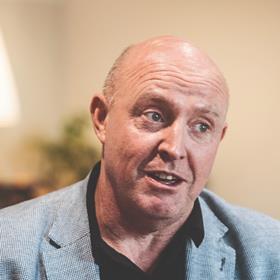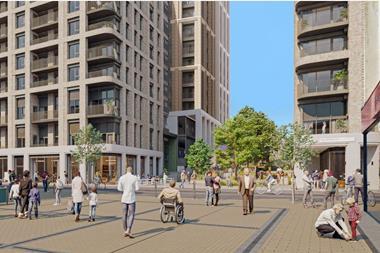Despite decades of housebuilding targets, Help to Buy, shared ownership and similar initiatives, the housing crisis is getting worse.

Panel of experts
- Rachel Allwood, planning director, Dandara Living
- Cirine El-Husseini, co-founder, Chalkhill Partners
- Justin Harley, regional director, Yardi
- Olivia Harris, chief executive, Dolphin Living
- David Mawson, chief executive, Placefirst
- Rory Musgrave, associate director, acquisitions, Long Harbour
- Andrew Saunders, contributing editor, Property Week (chair)






The expert think tank panel that assembled in December at x+why’s One Great Cumberland Place flexible office space in London examined how the build-to-rent (BTR) sector could help to boost the supply of affordable housing.
How can BTR help tackle the housing crisis?
David Mawson: This is a massive challenge and there isn’t one solution. If we look at population growth and the number of houses we are building, the simple fact is that the position is getting worse year on year. About one in 10 house sales come from the buy-to- let market, so that supply [of rented homes] is reducing.
At the same time, there are only about 10,000 institutionally owned single-family homes to rent in the UK – so the demand is very significant, but the number of BTR properties available is very small.
We must start thinking very differently – we need to look at retail in city centres that is not coming back into use and think about repurposing it. Planners and local authorities should be working up models with areas that are dedicated to rental properties. And we need to think about strategic housing plans that include a large proportion of institutionally rented properties.
Rachel Allwood: A study by homelessness charity Shelter in 2021 found that 17.5 million people in the UK are impacted by the housing emergency – that’s one in three of all adults, an immense number of people.
There are challenges across the board. Whether you are talking about BTR, build-to-sell, affordable or single-family homes, they are all affected by land availability, planning constraints and political issues. The housing crisis will continue, and all tenures, including BTR, have to play their part in reducing its impact. But if you look at many of the local plans coming forward, they don’t even mention rental as a product.
How important is raising the profile of BTR at the local authority level?
Rory Musgrave: BTR is obviously a very small part of both the housing sector and the private rental sector. The challenge is getting both local government and central government to understand that it is a viable way of building homes for people across the whole housing spectrum. We as an industry are trying to do our best when it comes to promoting BTR, and that is probably not the wrong thing to do.
Cirine El-Husseini: Away from the planning departments, it’s not that local authorities don’t ‘get’ rent. They do get it, they are just totally focused on either themselves, in the form of council houses, or the third sector being the first-line providers of new rental properties. They wait for housing associations or charities, rather than harnessing the massive power that can come through BTR, because they are fundamentally more comfortable with that provision.
What can BTR do better than build-to-sell?
Musgrave: We can deliver houses quickly, because we want to build them quickly and let them quickly. Build-to-sell housebuilders slow down the supply and trickle them out – they are controlling the market.
Quality is also important – we are a long-term investor and we hold for 20 years-plus. We want to deliver quality homes that people are prepared to pay rent for and to stay in for the long term.
Allwood: It’s not just about the quality of the homes, but everything that comes with it in terms of community creation, amenities and engagement. The way people want to live is changing; they like to connect with other people and enjoy the events that we put on – they don’t just want to live in an apartment and close the door.
Olivia Harris: In London last night, one in 50 households was in temporary accommodation. That includes thousands of children. We need homes now. If I have 25 homes, my letting time for them is simply how fast I can move 25 households in – I can deliver them all at once.
There is a general election coming this year. How important is national politics in enabling BTR to achieve its full potential in alleviating the housing crisis?
Allwood: According to a YouGov poll, given the choice of eight housing tenure types, only 11% of UK MPs would prioritise BTR in their constituencies: 10% of Labour MPs and 14% of Tories. That indicates the direction we have to go in, whichever party wins the election.
Mawson: The piece of work that we, as a sector, have got to do is highlight the kinds of people who are living in BTR. They aren’t people earning massive amounts; they are the people who make this country work. If we want to continue attracting good people to work in our health service, schools and universities, then we have got to build good BTR.

Justin Harley: There is always a danger that debates about BTR become echo chambers because everybody wants the same thing. But it always comes down to politics in the end. Whoever wins the election, that 11% figure is staggering. We need to get past that somehow, perhaps by taking housing away from the politicians, with something like a dedicated body that is tasked with delivering housing.
Harris: The issue is that housing and BTR are long term and politics is too short term. What we need is a political consensus on how we deliver housing, so that it can outlive an electoral term, or even two. That might mean compromise on both sides, but housing calls for a much longer-term focus.
Does the planning system need to change to deliver more BTR?
Allwood: I don’t think the system needs to change. What does is the way it is implemented. The changes to the National Planning Policy Framework and the levelling-up act are a bit of a distraction – better education about BTR and resourcing within the current system could deliver results more quickly than wholesale changes to planning.
El-Husseini: Resourcing is a huge point, and it does point to the system being broken. Local authorities overall have sacked 30% of their workforce over the past 10 years, if not more.
If we want to continue attracting good people to work in our health service, schools and universities, then we have got to build good BTR
David Mawson, Placefirst
Mawson: Often it’s down to leadership. There are some fantastic authorities that we work with that are really pushing forward and understand the need – it’s very easy to over-generalise.
Where are the opportunities for BTR to have the most impact?
Musgrave: Why can’t BTR fill the void that has been left by Help to Buy? That was a massive part of the housing market. We deliver quicker and the subsidies could go into BTR and help ease the housing crisis.
Mawson: A lot of the houses here today have been here for 40 or 50 years or more. There’s an opportunity to upgrade them – we’re spending £50,000 per unit built in the 1930s to get them to a standard where we are lifting the Energy Performance Certificate. We are also lifting the rent, but are delivering fantastic family homes. The demand is unbelievable – 70% of our properties are let at first viewing.
Harris: Local authorities should be obliged to look at housing need for their entire populations. Then they would identify lots of people who can’t afford to buy, don’t qualify for social housing and who can’t afford market rent but do need homes. They are people who can afford to pay rent, just not market rent.
If we want to help solve the housing crisis and build more affordable BTR homes, we really need to look at these people and what they can afford to pay.
Is there a role for technology in boosting BTR?
Harley: Technology is going to change the way we do everything, from construction and development through to operating and managing buildings and customer service, too. And although technology companies are still working out the applications for it, artificial intelligence in particular is going to be the biggest single technological change we’ve ever seen.
Musgrave: Technology also comes into delivery, which there is less focus on. It forms a huge part of building safety, because better-quality information allows you to show when homes have, or haven’t, been built properly, and that leads to safer homes. But it is expensive; we need to find a way to make it more affordable.
Renting in the UK is still seen as the poor relation compared with owning a home. How can this issue be addressed?
El-Husseini: Renting is awesome. Life changes, and you can just say “here’s my notice”, and get somewhere bigger, smaller or in a different neighbourhood. As a renter, I’ve had to move too often, though, usually because the owner wants to do something else. It’s about attracting more institutional capital – if more landlords become institutional landlords, people would flock to the sector rather than be forced into it.
Allwood: One of my biggest bugbears is that many of the people making decisions about BTR, including planners and politicians, have never set foot in a BTR development, or experienced living in one. Having that experience could perhaps undo some of the pre-judgements of the sector.
Harley: Perception is reality and the BTR sector needs to work hard to change perceptions. You can lobby politicians, but that is quite narrow, and the housing minister changes so often. The most effective sort of lobbying is a movement that goes mainstream. We need to start a movement involving everyone around this table – and, indeed, the whole sector.
Harris: The strongest voice we have got is our residents. We should be getting people out there to say “I’m proud to be renting, and this is what renting has done for me”. If we can get our residents advocating for us, the politicians will listen.































No comments yet